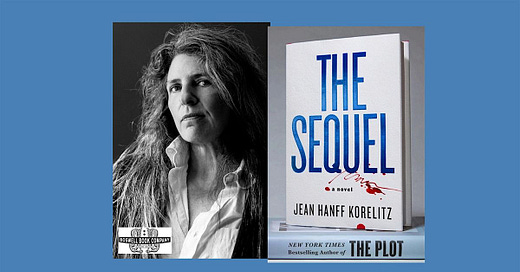Although I don’t imagine she knows or would care, I have something of a complicated relationship with Jean Hanff Korelitz, whom I’ve never met. I taught her son, a tremendously charismatic Princeton graduate, at Fieldston. I was also on a panel on Bruce Springsteen at The Strand six years ago with her husband, the similarly affable Paul Muldoon, former poetry editor of The New Yorker and recent interlocutor for Paul McCartney in a book of his lyrics. In 2009, I reviewed Korelitz’s novel Admission, about a college admissions officer at Princeton who comes to suspect that the son she gave up for adoption has applied to the school. (It was made into a pretty good movie starring Tina Fey and Paul Rudd, which leaves Amazon Prime tomorrow.) I found the novel to be a compelling read, but was troubled by the seemingly nonchalant stance the author took toward her protagonist’s questionable behavior.
Three years ago, I reviewed Korelitz’s novel The Plot, about a failed writer who secretly appropriates the plot of his late student's unpublished manuscript. The resulting book becomes a publishing phenomenon, but he begins to receive threatening messages from someone who claims he’s a plagiarist. (That idea would in turn be echoed in the 2023 novel Yellowface, which puts a racial spin on the idea when a white writer uses the idea of a dead Asian classmate.) The Plot is that rarest of breeds: a complex piece of metafiction with a tremendous narrative energy. It will soon be an HBO series starring Mahershala Ali.
Now Korelitz is back with The Sequel—which is, of course, the successor of The Plot, narrated from the point of view of the widow of The Plot’s protagonist. I can’t really tell you much about the story—which I found even more propulsive than its predecessor—without giving away its clever twists. So I’ll put that to the side.
Instead, I want to return to the thing that disturbed me about Admission: its cavalier, amoral air. The Sequel is a book in which a character coolly murders her parents, her child, her spouse, and a series of other figures who get in her way. At one point, she finds herself at an oak table where she had a meal with one of her victims before killing him. “She had no feelings about the table one way or the other, and it had not occurred to her to replace it, or its matching chairs,” she muses. “Why should she?”
It's not clear whether we’re to regard this character as an American psycho or not, and if asked I suspect Korelitz would say this is something for the reader to decide. I like to think of myself as someone who isn’t susceptible to sentimental bourgeois morality, and I certainly enjoy war movies and murder mysteries (though not horror) as much as the next gal. But given the unmistakable literary finish of this book, the crimes in question seem less like genre conventions than a silken, unmistakably Nietzschean statement about the way the world works. In this regard I was struck by a passage late in the novel in which the character in question reflects on her crimes:
[She] had not acted out of personal grievance, malice, greet, or at least not only those things. Never once had she imposed her will on a person who hadn’t first chosen to constrain her, assault her, thwart her, or malign her. The world, she knew, was full of people who seemed to enjoy doing harm for its own sake, and she had no hope of ever understanding those people, even if she wanted to understand them (which, to be honest, she did not). But she wasn’t one of them. People like that could not be fixed, not even persuaded to act differently. Why exhaust oneself trying to revise a person’s essential nature? It was impossible. It made more accept the things one could not change.
Accept the things one could not change: Saint Francis is turning in his grave.
We’ll put aside the fact that this character really did impose her will on wholly innocent people (she rationalizes her monstrous acts as legitimate responses to real wrongs she did in fact suffer). What’s really chilling here is the purely instrumental logic, precisely because it seems so sensible. We tend to interpret the phrase “self-interest rightly understood” in terms of enlightenment: doing well by doing good. But in the world of Korelitz, doing well seems to be its own justification—if, of course, you have the skill and nerve to pull it off. Which, naturally, only a few talented Ripleys can do. Perhaps not surprisingly, there are no shrewd cops on the beat here: official authority, which tends to be stupid, is for little people.
What’s finally troubling is the soullessness at the heart of this vision: there is no larger touchstone, no transcendent value, to guide or check behavior. But even more than that is the remarkable silence in this regard in the larger discourse of the novel—I haven’t seen anyone talk about this aspect of Korelitz’s work. Here, truly, is the dead end of the modern project. For all her unquestionable intelligence, talent, and elegance, she resembles no one more in her notion of realism than Donald Trump: Morals are for suckers. Art of the deal, indeed.




When your morality is attached to how you "feel" about something, you have no reliable moral rudder, compass, North Star. Obviously, there were Nazis who did not feel badly about the Holocaust. It must be exhausting to live without faith. All religions are flawed but I have not seen a viable alternative for conscience building.